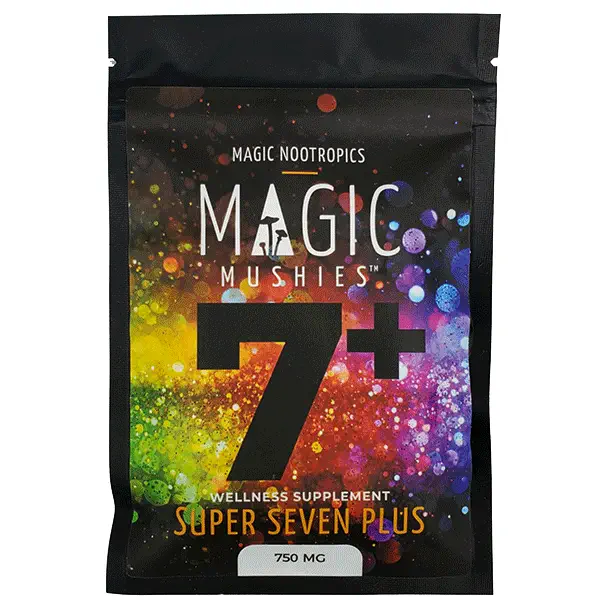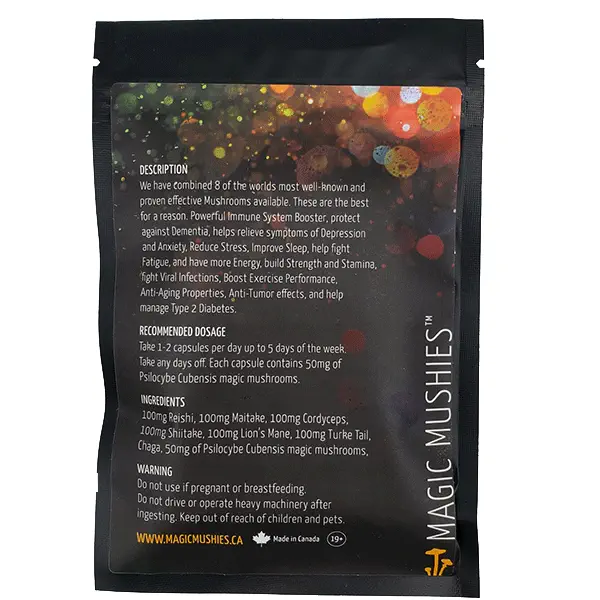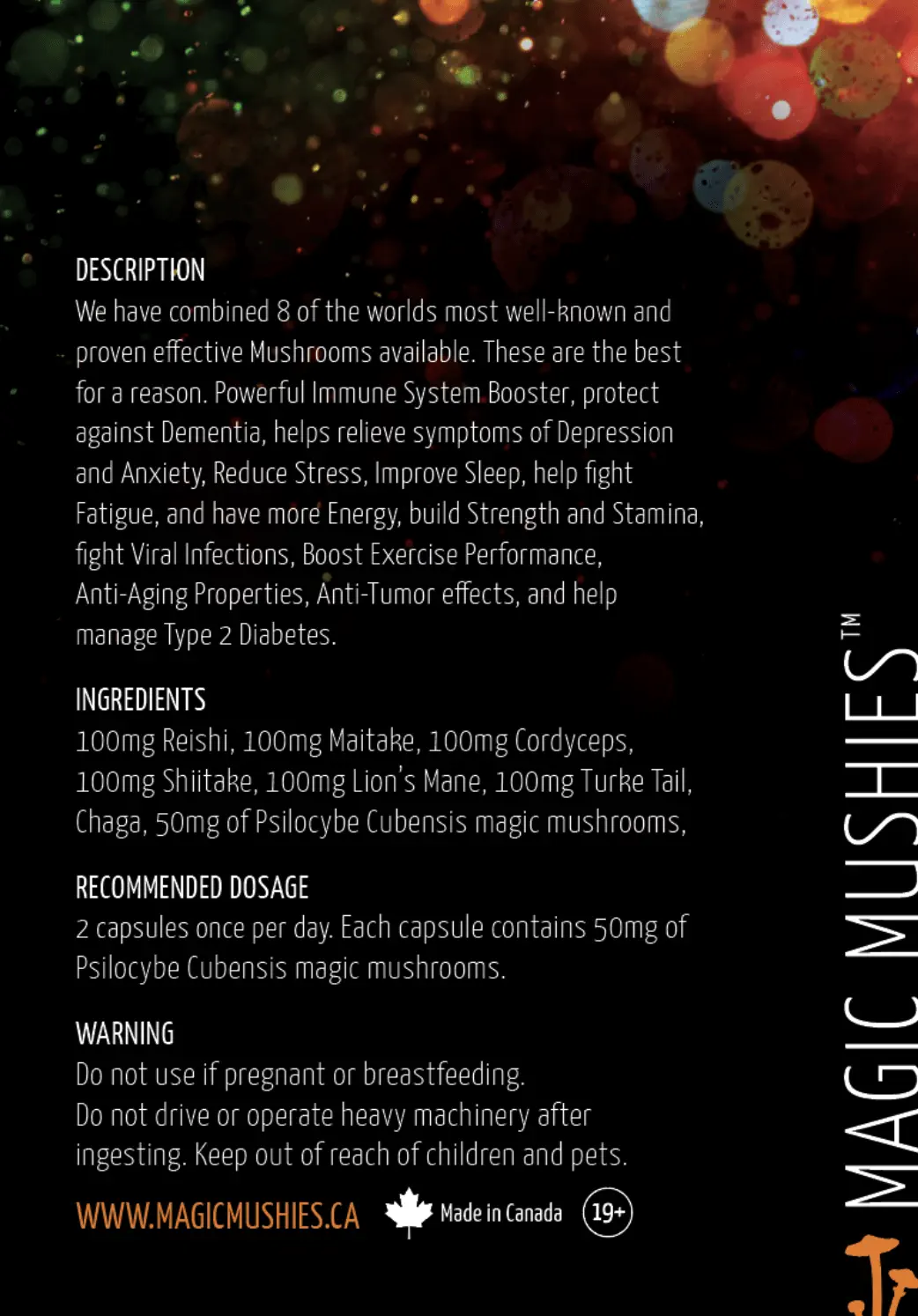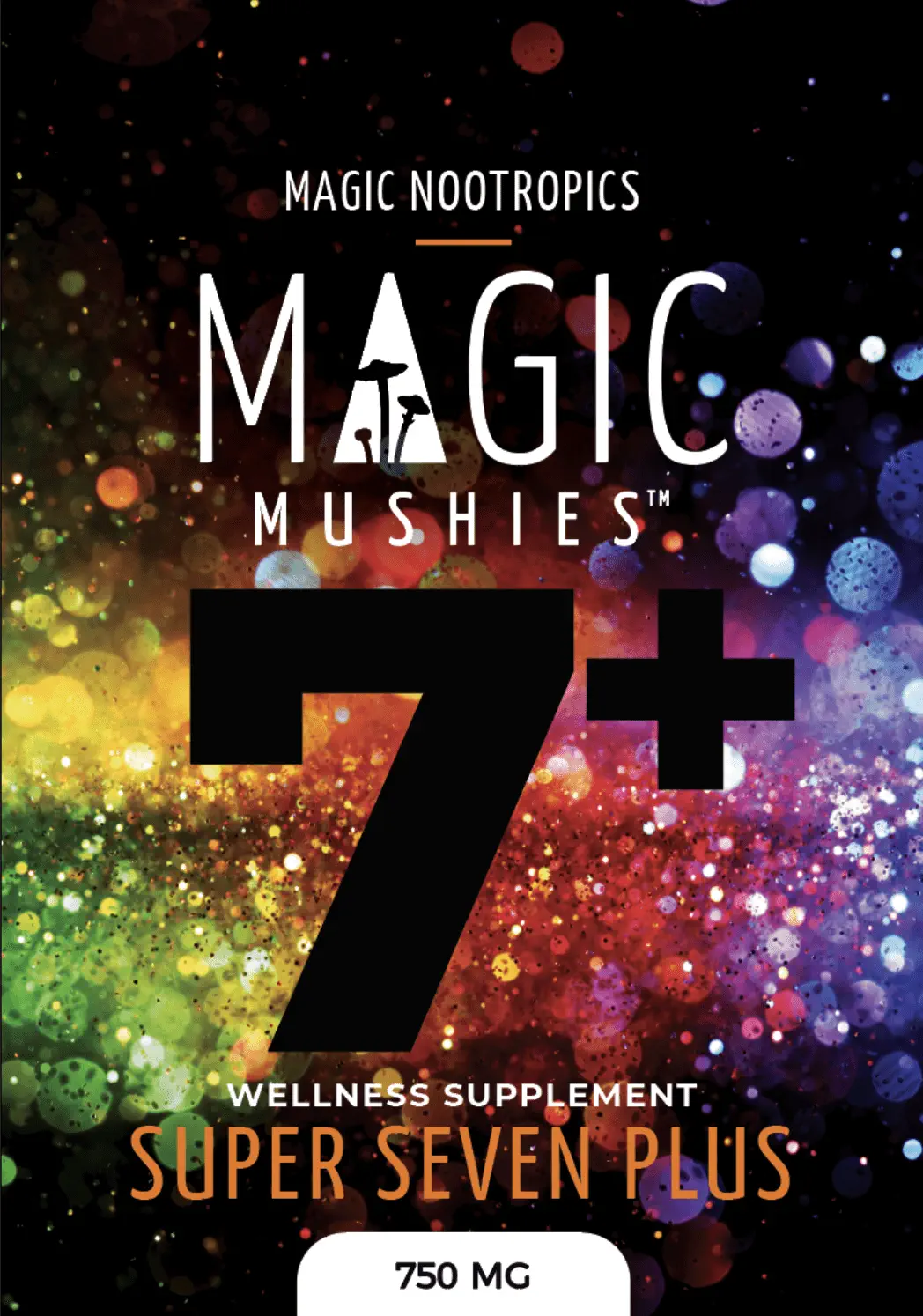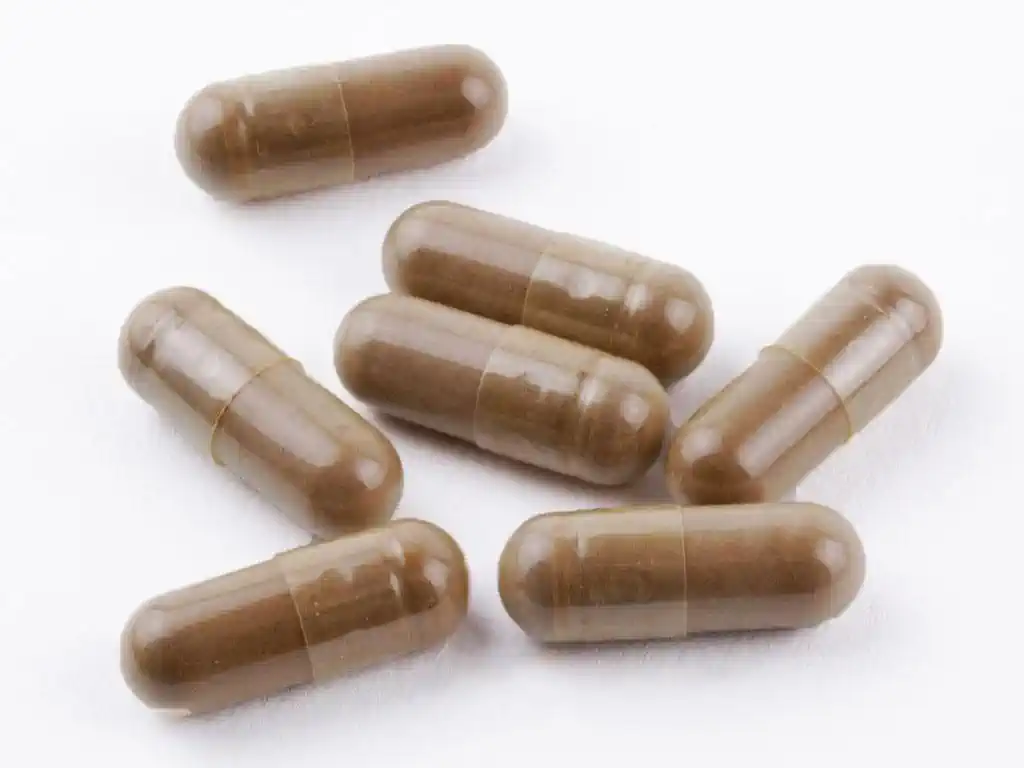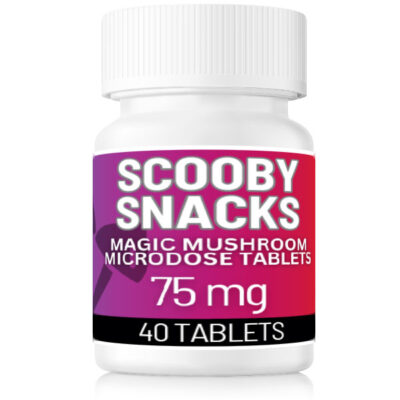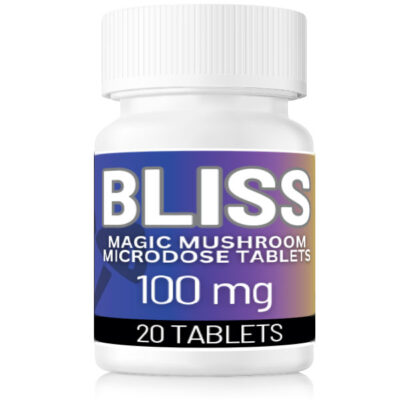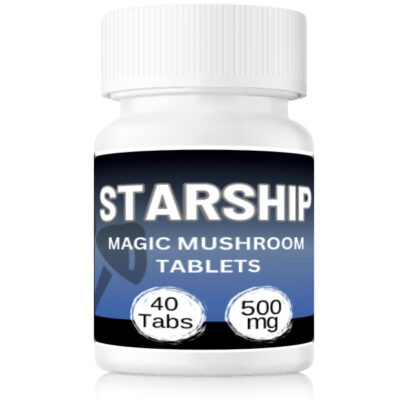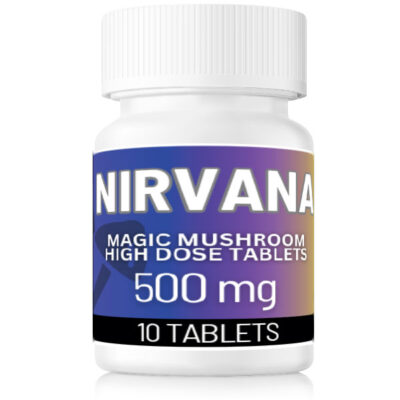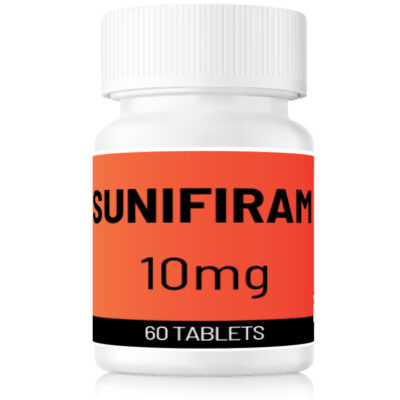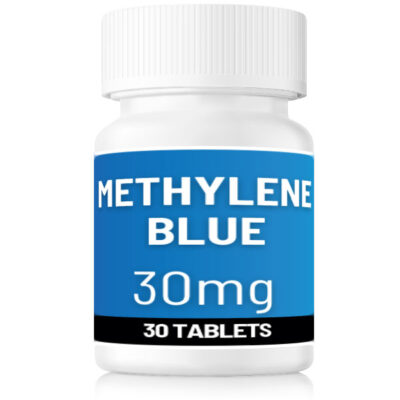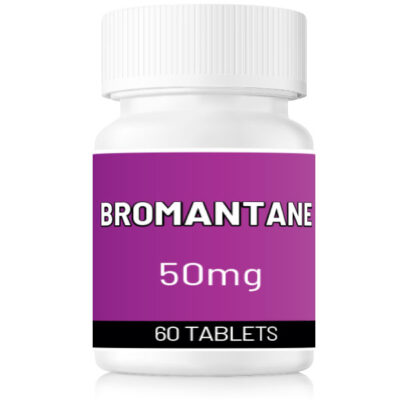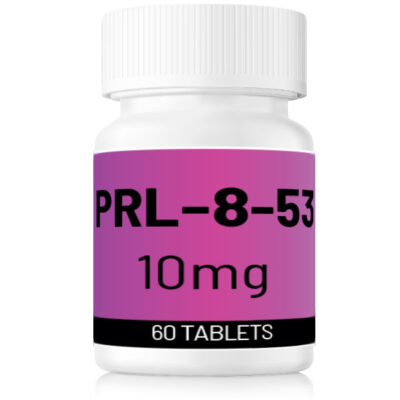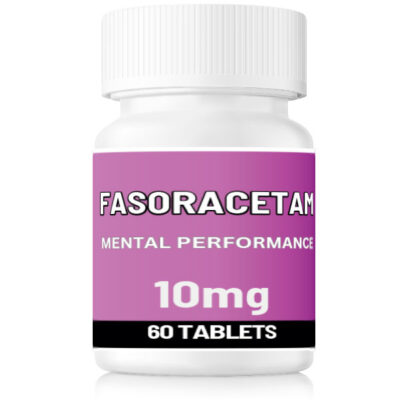Magic Nootropics Super Seven Plus 50mg
$39.99 – $149.99
We have combined 8 of the worlds most well-known and proven effective Mushrooms available
Rich in: Antioxidants, Beta-glucans, loaded with Vitamins including B, B12, C, Copper, Potassium, Fiber, Minerals, Amino acids.
- 50mg of Golden Teacher Psilocybe Cubensis (Magic Mushrooms) in each capsule
- Reishi, Maitake, Cordyceps, Shiitake, Lion’s Mane, Turkey Tail, Chaga
Choose 20, 50, or 100 capsules per package. Recommended Dose: 1-2 Capsules
Product Details
We have combined 8 of the worlds most well-known and proven effective Mushrooms available
Rich in: Antioxidants, Beta-glucans, loaded with Vitamins including B, B12, C, Copper, Potassium, Fiber, Minerals, Amino acids.
- 50mg of Golden Teacher Psilocybe Cubensis (Magic Mushrooms) in each capsule
- Reishi, Maitake, Cordyceps, Shiitake, Lion’s Mane, Turkey Tail, Chaga
Choose 20, 50, or 100 capsules per package. Recommended Dose: 1-2 Capsules
Reishi
1. Boost the Immune System
he most important effects of the reishi mushroom is that it can boost your immune system (4Trusted Source). While some details are still uncertain, test-tube studies have shown that reishi can affect the genes in white blood cells, which are critical parts of your immune system. What’s more, these studies have found that some forms of reishi may alter inflammation pathways in white blood cells (5Trusted Source). Research in cancer patients has shown that some of the molecules found in the mushroom can increase the activity of a type of white blood cell called natural killer cells (6Trusted Source). Natural killer cells fight infections and cancer in the body (7Trusted Source). Another study found that reishi can increase the number of other white blood cells (lymphocytes) in those with colorectal cancer (2Trusted Source). Although most immune system benefits of reishi mushroom have been seen in those who are ill, some evidence has shown that it can help healthy people, too. In one study, the fungus improved lymphocyte function, which helps fight infections and cancer, in athletes exposed to stressful conditions (8Trusted Source, 9Trusted Source). However, other research in healthy adults showed no improvement in immune function or inflammation after 4 weeks of taking reishi extract (10Trusted Source). Overall, it is clear that reishi impacts white blood cells and immune function. More research is needed to determine the extent of the benefits in the healthy and ill.
SUMMARY: Reishi mushroom can enhance immune function through its effects on white blood cells, which help fight infection and cancer. This may occur primarily in those who are ill, as mixed results have been seen in those who are healthy.
2. Anti-Cancer Properties
Reishi mushroom can enhance immune function through its effects on white blood cells, which help fight infection and cancer. This may occur primarily in those who are ill, as mixed results have been seen in those who are healthy. Many people consume this fungus due to its potential cancer-fighting properties (11, 12Trusted Source). In fact, one study of over 4,000 breast cancer survivors found that around 59% consumed reishi mushroom (13Trusted Source). Additionally, several test-tube studies have shown that it can lead to the death of cancer cells (14Trusted Source, 15Trusted Source, 16Trusted Source). Yet the results of these studies do not necessarily equate to effectiveness in animals or humans. Some research has investigated if reishi could be beneficial for prostate cancer due to its effects on the hormone testosterone (17, 18Trusted Source). While one case study showed that molecules found in this mushroom may reverse prostate cancer in humans, a larger follow-up study did not support these findings (19Trusted Source, 20Trusted Source). Reishi mushroom has also been studied for its role in preventing or fighting colorectal cancer (2Trusted Source, 21Trusted Source). Some research showed that one year of treatment with reishi decreased the number and size of tumors in the large intestine (21Trusted Source). What’s more, a detailed report of multiple studies indicated that the mushroom can beneficially affect cancer patients (22Trusted Source). These benefits included increasing the activity of the body’s white blood cells, which help fight cancer, and improving quality of life in cancer patients. However, researchers state that reishi should be administered in combination with traditional treatment rather than replacing it (22Trusted Source). What’s more, many of the studies of reishi mushroom and cancer were not high-quality. Because of this, much more research is needed (11, 23Trusted Source).
SUMMARY: Although reishi mushroom appears to hold some promise for cancer prevention or treatment, more information is needed before it becomes part of standard therapy. However, it may be appropriate to use in addition to normal care in some cases.
3. Could Fight Fatigue and Depression
Reishi’s effects on the immune system are often most emphasized, but it has other potential advantages as well. These include reduced fatigue and depression, as well as improved quality of life. One study examined its effects in 132 people with neurasthenia, a poorly defined condition associated with aches, pains, dizziness, headaches and irritability (24Trusted Source). The researchers found that fatigue was reduced and well-being was improved after 8 weeks of taking the supplements.\ Another study found that fatigue was reduced and quality of life was improved after 4 weeks of taking reishi powder in a group of 48 breast cancer survivors (25Trusted Source). What’s more, the people in the study also experienced less anxiety and depression. While reishi mushroom may hold promise for people with certain diseases or illnesses, it is not clear if it would benefit those who are otherwise healthy.
SUMMARY: Some preliminary studies have shown that reishi mushroom could decrease anxiety and depression as well as improve quality of life in those with certain medical conditions.
4. Heart Health
One 12-week study of 26 people showed that reishi mushroom may increase “good” HDL cholesterol and decrease triglycerides (26Trusted Source). However, other research in healthy adults showed no improvement in these heart disease risk factors (10Trusted Source). Moreover, a large analysis demonstrated no beneficial effects for heart health after examining five different studies containing around 400 people. The researchers found that consuming reishi mushroom for up to 16 weeks did not improve cholesterol (27Trusted Source). Overall, more research is needed in regard to reishi mushrooms and heart health.
5. Blood Sugar Control
Several studies have indicated that molecules found in the reishi mushroom can decrease blood sugar in animals (28Trusted Source, 29Trusted Source). Some preliminary research in humans reported similar findings (30). However, the majority of research has not supported this benefit. After evaluating hundreds of participants, researchers found no benefits for fasting blood sugar (27Trusted Source). Mixed results were seen for blood sugar after meals. In some cases, reishi mushroom lowered blood sugar, but in other cases, it was worse than a placebo. Again, more research is needed here as well.
6. Antioxidant Status
Antioxidants are molecules that can help prevent damage to your cells (31). Because of this important function, there is substantial interest in foods and supplements that can enhance antioxidant status in the body. Many claim that reishi mushroom is effective for this purpose. However, several studies have found no change in the levels of two important antioxidant enzymes in the blood after consuming the fungus for 4 to 12 weeks (10Trusted Source, 26Trusted Source).
SUMMARY: A small amount of research has shown that reishi mushroom could improve good cholesterol or blood sugar. However, the majority of the research indicates that it does not improve cholesterol, blood sugar or antioxidants in the body.
Maitake Mushrooms
Compared to other mushrooms, maitake has shown better results in preventing and treating cancer and other health conditions. Maitake also has a positive effect on overall immunity.
Maitake mushrooms are rich in:
- antioxidants
- beta-glucans
- vitamins B and C
- copper
- potassium
- fiber
- minerals
- amino acids
The mushrooms are also:
- fat-free
- low-sodium
- low-calorie
- cholesterol-free
Scientists are currently studying the unique way the mushroom supports overall health and fights illness.
What the research says
Laboratory research suggests that maitake may be effective in treating certain illnesses. More studies are needed to confirm its effect on humans, but the current findings are promising.
Cancer
A 2013 study indicates that maitake D-Fraction could be useful in preventing and treating breast cancer. Researchers suggest that this mushroom can fight the growth and reproduction of cancerous cells. Maitake mushroom has been shownTrusted Source to suppress tumor growth in mice. It can also increase the number of cells fighting against the tumor. This suggests that it could also be effective in managing cancer in humans when taken orally. An earlier study found maitake D-Fraction, which is an extract, to be efficient in killing human cancer cells. It was taken alongside a protein that also fights cancer and succeeded in increasing the protein’s effectiveness.
Cholesterol
Researchers in a 2013 study found that maitake powdered extract lowered cholesterol levels in mice. It was also shown to increase fatty acids that provide energy. Because of this, researchers theorized that eating maitake mushroom may help keep arteries healthy.
Type 2 Diabetes
The results of a 2015 study Trusted Source showed that maitake mushroom can have a positive effect on rats with type 2 diabetes. During the study, maitake mushroom consumption had a positive effect on glucose levels of rats. This points to the mushroom’s potential to treat type 2 diabetes in humans.
Maitake mushroom may also be useful in treating:
- cold and flu viruses
- high or low blood pressure
- immune function
- side effects of chemotherapy
Cordyceps
1. May Boost Exercise Performance
Cordyceps are thought to increase the body’s production of the molecule adenosine triphosphate (ATP), which is essential for delivering energy to the muscles. This may improve the way your body uses oxygen, especially during exercise (1Trusted Source, 2). In one study, researchers tested their effects on exercise capacity in 30 healthy older adults using a stationary bike. Participants received either 3 grams per day of a synthetic strain of Cordyceps called CS-4 or a placebo pill for six weeks. By the end of the study, VO2 max had increased by 7% in participants who had taken CS-4, while participants given the placebo pill showed no change (3). VO2 max is a measurement used to determine fitness level (4Trusted Source). In a similar study, 20 healthy older adults received either 1 gram of CS-4 or a placebo pill for 12 weeks (5Trusted Source). While researchers found no change in VO2 max in either group, participants given CS-4 improved other measures of exercise performance. One study also tested the effects of a Cordyceps-containing mushroom blend on exercise performance in younger adults (6Trusted Source). After three weeks, participants’ VO2 max had increased by 11%, compared to a placebo.
However, the current research suggests Cordyceps are not effective at improving exercise performance in trained athletes (7Trusted Source, 8).
SUMMARY: Cordyceps have been shown to improve measures of exercise performance in older and younger adults, but not in well-trained athletes.
2. Anti-Aging Properties
The elderly have traditionally used Cordyceps to reduce fatigue and boost strength and sex drive. Researchers believe their antioxidant content may explain their anti-aging potential (9Trusted Source). Several studies have found that Cordyceps increase antioxidants in aged mice, helping improve memory and sexual function (10Trusted Source, 11Trusted Source, 12Trusted Source). Antioxidants are molecules that fight cell damage by neutralizing free radicals, which can otherwise contribute to disease and aging (13Trusted Source, 14Trusted Source, 15Trusted Source). One study found that mice that given Cordyceps lived several months longer than mice given a placebo (16). Another study found that Cordyceps extended the lives of fruit flies, further supporting the belief that they have anti-aging benefits (17Trusted Source).
However, it’s unknown if Cordyceps have these same anti-aging benefits in humans.
SUMMARY: Research in mice suggests Cordyceps have anti-aging properties. While these findings are promising, it’s unknown whether they apply to humans.
3. Potential Anti-Tumor Effects
Cordyceps’ potential to slow the growth of tumors has generated significant interest in recent years. Researchers believe the fungi may exert anti-tumor effects in several ways. In test-tube studies, Cordyceps have been shown to inhibit the growth of many types of human cancer cells, including lung, colon, skin and liver cancers (18Trusted Source, 19Trusted Source, 20Trusted Source, 21Trusted Source). Studies in mice have also shown that Cordyceps have anti-tumor effects on lymphoma, melanoma and lung cancer (22Trusted Source, 23Trusted Source, 24Trusted Source, 25Trusted Source). Cordyceps may also reverse the side effects associated with many forms of cancer therapy. One of these side effects is leukopenia. Not to be confused with the cancer leukemia, leukopenia is a condition in which the number of white blood cells (leukocytes) decreases, lowering the body’s defenses and increasing the risk of infection (26Trusted Source). One study tested the effects of Cordyceps on mice that developed leukopenia after radiation and treatments with Taxol, a common chemotherapy drug (27Trusted Source). Interestingly, Cordyceps reversed the leukopenia. These results suggest the fungi may help reduce complications associated with some cancer treatments. However, it’s important to note that these studies were performed in animals and test tubes, not humans.
The effects of Cordyceps on leukopenia and tumor growth in humans is unknown, so health experts can’t currently draw conclusions.
SUMMARY: Test-tube and animal studies suggest Cordyceps may have the potential to treat cancer, as well as some side effects of cancer treatments. However, these effects have not been shown in humans, and more research is needed.
Cordyceps contain a special type of sugar that may help treat diabetes. Diabetes is a disease in which the body either does not produce or respond to the hormone insulin, which normally transports the sugar glucose into your cells for energy. When your body does not produce enough insulin or respond well to it, glucose cannot enter the cells, so it stays in the blood. Over time, having too much glucose in the blood can cause serious health problems. Therefore, it’s important for people with diabetes to make sure their blood sugar levels are well controlled. Interestingly, Cordyceps may keep blood sugar levels within a healthy range by mimicking the action of insulin. In several studies in diabetic mice, Cordyceps have been shown to decrease blood sugar levels (28Trusted Source, 29Trusted Source, 30Trusted Source). Some evidence suggests that they may also protect against kidney disease, a common complication of diabetes. In a review of 22 studies including 1,746 people with chronic kidney disease, those who took Cordyceps supplements experienced improved kidney function (31Trusted Source).
However, these results aren’t conclusive. The authors of the review stated that many of the studies were low quality. Therefore, no conclusions could be made about the effects of Cordyceps on kidney function in humans with chronic kidney disease.
SUMMARY: Chronically elevated blood sugar levels are common in people with uncontrolled diabetes and can have serious health effects. Research in animals suggests Cordyceps may have potential as a diabetes treatment.
5. Possible Benefits for Heart Health
As research emerges on the effects of Cordyceps on heart health, the benefits of the fungi are becoming increasingly apparent. In fact, Cordyceps are approved in China for the treatment of arrhythmia, a condition in which the heartbeat is too slow, too fast or irregular (32Trusted Source). A study found that Cordyceps significantly reduced heart injuries in rats with chronic kidney disease. Injuries to the heart from chronic kidney disease are thought to increase the risk of heart failure, so reducing these injuries may help avoid this outcome (33Trusted Source). The researchers attributed these findings to the adenosine content of Cordyceps. Adenosine is a naturally occurring compound that has heart-protective effects (34Trusted Source). Cordyceps may also have a beneficial effect on cholesterol levels. Animal research has shown that Cordyceps decrease “bad” LDL cholesterol (35Trusted Source, 36Trusted Source, 37). LDL can raise your risk of heart disease by leading to the buildup of cholesterol in your arteries. Similarly, Cordyceps have been shown to decrease triglyceride levels in mice (35Trusted Source). Triglycerides are a type of fat found in your blood. High levels are linked to a greater risk of heart disease (38Trusted Source).
Unfortunately, there is insufficient evidence to determine whether Cordyceps benefit heart health in humans.
SUMMARY: Cordyceps may benefit heart health by helping prevent arrhythmias and lowering levels of triglycerides and “bad” LDL cholesterol.
6. May Help Fight Inflammation
Cordyceps is said to help fight inflammation in the body. Although some inflammation is good, too much can lead to diseases like heart disease and cancer. Research has shown that when human cells are exposed to Cordyceps, special proteins that increase inflammation in the body become suppressed (39Trusted Source, 40Trusted Source, 41Trusted Source, 42Trusted Source). Thanks to these potential effects, researchers believe Cordyceps may serve as a useful anti-inflammatory supplement or drug (42Trusted Source). In fact, Cordyceps have been shown to reduce inflammation in the airways of mice, making them a potential therapy for asthma. However, the fungi appear to be less effective than commonly prescribed drugs used to provide relief for inflamed areas of the body (43Trusted Source). Cordyceps may also have topical uses. One study found it reduced skin inflammation when applied topically in mice, further demonstrating its anti-inflammatory properties (44Trusted Source). The potential inflammation-fighting properties of Cordyceps have yet to be observed in humans.
SUMMARY: Research suggests Cordyceps decrease inflammatory markers in animals. However, their effects on inflammation in humans remain unknown.
Shiitake Mushrooms
Shiitake mushrooms may promote heart health, reduce prostate cancer risk, help with gingivitis, boost immunity, and improve the nutritional status of plant-based eaters. Shiitake mushrooms also have been used as a natural remedy in alternative medicine for centuries. Likewise, modern medicine demonstrates shiitake mushrooms’ promising health benefits. Here is a closer look at some of the potential health benefits of shiitake mushrooms.
1. Promotes Heart Health
Naturally low in sodium and free of saturated fats, mushrooms are heart-healthy food, especially when used as an alternative to processed meats. The beta-glucan (a type of soluble fiber) in shiitake mushrooms is useful for cholesterol reduction.5 The potassium in shiitake mushrooms is also beneficial for reducing blood pressure.
2. Reduces Risk of Prostate Cancer
A 2019 study following more than 36,000 men in Japan between ages 40 and 79 found a correlation between mushroom consumption and lowered incidence of prostate cancer. Researchers attribute the relationship to ergothioneine, an antioxidant in mushrooms like shiitake, king oyster, oyster, and maitake varieties that can ease oxidative stress.6
3. Helps Prevent Gingivitis
Gingivitis is a preventable dental disease caused by plaque buildup and the accumulation of “bad” bacteria in the mouth. This bacteria damages gum tissues and may lead to complications such as periodontal disease. Studies have shown that shiitake mushroom extract can reduce this harmful bacteria while preserving healthy bacteria.7 These results suggest dental health benefits associated with shiitake mushrooms.
4. Aids Immunity
Because not much copper is stored in the body, having a reliable food source can help prevent a deficiency. A cup of cooked shiitake mushrooms contains more than the daily required amount of copper for most adults. Copper is vital for the immune system, supporting the creation and activity of various immune cells, including T cells, neutrophils, phagocytes, B-lymphocytes, natural killer cells, and antibodies.8
5. Improves Nutritional Status of Vegetarians
Shiitake mushrooms offer several nutrients of interest to vegetarians, helping reduce the risk of deficiencies. Shiitake mushrooms are a good source of zinc. Zinc is typically found in red meat, poultry, and seafood. Because a cup of cooked shiitake mushrooms has almost 2 milligrams of zinc, it helps contribute to a daily goal of 8 to 11 milligrams per day.9
Lion’s Mane
1. Could Protect Against Dementia
The brain’s ability to grow and form new connections typically declines with age, which may explain why mental functioning gets worse in many older adults (3Trusted Source). Studies have found that lion’s mane mushrooms contain two special compounds that can stimulate the growth of brain cells: hericenones and erinacines (4Trusted Source). Additionally, animal studies have found that lion’s mane may help protect against Alzheimer’s disease, a degenerative brain disease that causes progressive memory loss. In fact, lion’s mane mushroom and its extracts have been shown to reduce symptoms of memory loss in mice, as well as prevent neuronal damage caused by amyloid-beta plaques, which accumulate in the brain during Alzheimer’s disease (5Trusted Source, 6Trusted Source, 7Trusted Source, 8Trusted Source). While no studies have analyzed whether lion’s mane mushroom is beneficial for Alzheimer’s disease in humans, it appears to boost mental functioning. A study in older adults with mild cognitive impairment found that consuming 3 grams of powdered lion’s mane mushroom daily for four months significantly improved mental functioning, but these benefits disappeared when supplementation stopped (9Trusted Source). The ability of lion’s mane mushroom to promote nerve growth and protect the brain from Alzheimer’s-related damage may explain some of its beneficial effects on brain health. However, it’s important to note that most of the research has been conducted in animals or in test tubes. Therefore, more human studies are needed.
SUMMARY: Lion’s mane mushrooms contain compounds that stimulate the growth of brain cells and protect them from damage caused by Alzheimer’s disease. However, more human research is needed.
2. Helps Relieve Mild Symptoms of Depression and Anxiety
Up to one-third of people living in developed countries experience symptoms of anxiety and depression (10Trusted Source). While there are many causes of anxiety and depression, chronic inflammation could be a major contributing factor. New animal research has found that lion’s mane mushroom extract has anti-inflammatory effects that can reduce symptoms of anxiety and depression in mice (11Trusted Source, 12Trusted Source). Other animal studies have found that lion’s mane extract can also help regenerate brain cells and improve the functioning of the hippocampus, a region of the brain responsible for processing memories and emotional responses (13Trusted Source, 14Trusted Source). Researchers believe that improved functioning of the hippocampus may explain the reductions in anxious and depressive behaviors in mice given these extracts. While these animal studies are promising, there is very little research in humans. One small study in menopausal women found that eating cookies containing lion’s mane mushrooms daily for one month helped reduce self-reported feelings of irritation and anxiety (15Trusted Source)
SUMMARY: Studies suggest that lion’s mane mushrooms may help relieve mild symptoms of anxiety and depression, but more human research is needed to better understand the correlation.
3. May Speed Recovery from Nervous System Injuries
The nervous system consists of the brain, spinal cord and other nerves that travel throughout the body. These components work together to send and transmit signals that control almost every bodily function. Injuries to the brain or spinal cord can be devastating. They often cause paralysis or loss of mental functions and can take a long time to heal. However, research has found that lion’s mane mushroom extract may help speed recovery from these types of injuries by stimulating the growth and repair of nerve cells (16Trusted Source, 17Trusted Source, 18Trusted Source). In fact, lion’s mane mushroom extract has been shown to reduce recovery time by 23–41% when given to rats with nervous system injuries (19Trusted Source). Lion’s mane extract may also help reduce the severity of brain damage after a stroke. In one study, high doses of lion’s mane mushroom extract given to rats immediately after a stroke helped decrease inflammation and reduce the size of stroke-related brain injury by 44% (20Trusted Source). While these results are promising, no studies have been conducted in humans to determine if lion’s mane would have the same therapeutic effect on nervous system injuries.
SUMMARY: Rat studies have found that lion’s mane extract can speed up recovery time from nervous system injuries, but human research is lacking.
4. Protects Against Ulcers in the Digestive Tract
Ulcers are capable of forming anywhere along the digestive tract, including the stomach, small intestine and large intestine. Stomach ulcers are often caused by two major factors: overgrowth of a bacteria called H. pylori and damage to the mucous layer of the stomach that’s often due to long-term use of non-steroidal anti-inflammatory drugs (NSAIDs) (21Trusted Source). Lion’s mane extract may protect against the development of stomach ulcers by inhibiting the growth of H. pylori and protecting the stomach lining from damage (2Trusted Source, 22Trusted Source). Several studies have found that lion’s mane extract can prevent the growth of H. pylori in a test tube, but no studies have tested whether they have the same effects inside the stomach (23Trusted Source, 24Trusted Source). Additionally, an animal study found that lion’s mane extract was more effective at preventing alcohol-induced stomach ulcers than traditional acid-lowering drugs — and without any negative side effects (25Trusted Source). Lion’s mane extract can also reduce inflammation and prevent tissue damage in other areas of the intestines. In fact, they may help treat inflammatory bowel diseases like ulcerative colitis and Crohn’s disease (26Trusted Source, 27Trusted Source, 28Trusted Source). One study in people with ulcerative colitis found that taking a mushroom supplement containing 14% lion’s mane extract significantly reduced symptoms and improved quality of life after three weeks (29Trusted Source). However, when the same study was repeated in patients with Crohn’s disease, the benefits were no better than a placebo (30Trusted Source). It’s important to note that the herbal supplement used in these studies included several types of mushrooms, so it’s difficult to draw any conclusions about the effects of lion’s mane specifically. Overall, research suggests that lion’s mane extract may help inhibit the development of ulcers, but more human research is needed
SUMMARY: Lion’s mane extract has been shown to protect against stomach and intestinal ulcers in rodents, but human research has been conflicting.
5. Reduces Heart Disease Risk
Turkey Tail
Chaga
I noticed it's helping my sleep and my Traumatic brain injury recovery. I'm able to step back and regroup more easily
They are AMAZING
Only logged in customers who have purchased this product may leave a review.

